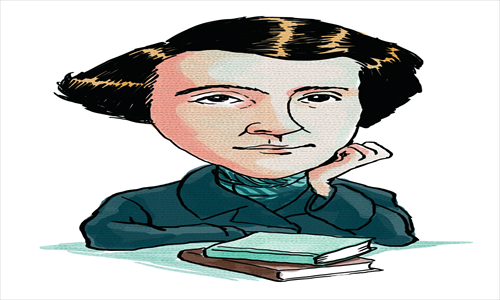Tocqueville’s insight resonates but new revolution not on horizon

The Old Regime and the Revolution, written by the French thinker Alexis de Tocqueville (1805-59) is now a bestseller in China after being recommended by top leaders for officials' reading.
But another reason is the quality of the writing itself. The German-American political philosopher Leo Strauss commented of Tocqueville's first masterpiece Democracy In America that "no book comparable in breadth and depth has ever been produced afterwards."
And as well as being one of the greatest analyses of a key historical event, the French revolution, it also contains timeless wisdom. While a large literature pretends to anticipate the future state of the world, Tocqueville's lucidity sobers: "Philosophers and statesmen may learn a valuable lesson of modesty from the history of our Revolution, for there never were events greater, better prepared, longer matured, and yet so little foreseen."
The observations in The Old Regime and the Revolution have a certain degree of relevance for today's Chinese readers.
In the chapter on the relative economic prosperity of Louis XVI's reign, Tocqueville reminds us that "revolutions are not always brought about by a gradual decline from bad to worse," and, he also states "Though the king used the language of a master, he was, in reality, the slave of public opinion."
However, it would be fallacious, and certainly not Tocquevillian, to infer from these apparent similarities that China is on the verge of major political convulsions.
Tocqueville fully appreciates the importance of context, and concluding his inquiry on the causes of the French revolution he refers to the uniqueness of the country which generated it: "When I examine that nation in itself, I can not help thinking it is more extraordinary than any of the events of its history."
The events described in The Old Regime and the Revolution have only a superficial resonance in today's China. They are not the harbingers of upheavals to come, but they operate as a framework to better comprehend China's recent past.
The Xinhai Revolution in 1911 marked the end of over 2,000 years of the imperial system, followed by the Maoist revolution 64 years ago. These constitute a discontinuity comparable with the French revolution.
Tocqueville was not the mere reporter of the ups and downs of political vicissitude. He conceptualized the transition between two worlds, the fall of aristocratic values and the rise of equality, a profound transformation whose dramatic dynamics were beautifully captured by Sicilian aristocrat Giuseppe di Lampedusa's novel The Leopard.
What Tocqueville, in his preface to The Old Regime and the Revolution, called the "three truths," offer, in retrospect, a perspective on China's 20th century.
The People's Republic of China has certainly witnessed the destruction of the Chinese aristocracy, the first "truth," and the establishment of the equality of conditions among the individuals which is the mark of a democratic society.
But the two other "truths" which coexist with the inevitability of the aristocracy's ruin also manifested in China: Without aristocracies despotism imposes itself more easily, and "despotisms can never be so injurious" as in societies of this nature.
In The Old Regime and the Revolution, Tocqueville warned: "I do not hesitate to affirm that the common level of hearts and minds will never cease to sink so long as equality and despotism are combined."
Tocqueville theorized what would become in the Chinese context the tragedy of the Cultural Revolution (1966-76), the unchecked despotism over equal but isolated individuals, the command of an emperor without the imperial hierarchy, rites and customs to channel and moderate its dominance.
The current popularity of The Old Regime and the Revolution in China should not be interpreted as an imminent sign of another Chinese revolution, but we should also not stop reflecting in the middle of an equalizing globalization on the best ways to preserve liberty.
In his Democracy In America, while Tocqueville depicts the new but monotonous spectacle of social homogeneity, he continues to affirm his preference for difference: "I am very far from thinking that we ought to follow the example of the American democracy, and copy the means which it has employed to attain its ends […] I should regard it as a great misfortune for mankind if liberty were to exist all over the world under the same forms."
There's no doubt China's 21st century efforts to invent new forms of political modernity would have been for the French aristocrat an extraordinary source of intellectual stimulation.
The author is director of the Academia Sinica Europaea at China Europe International Business School, Shanghai, Beijing & Accra, and founder of the Euro-China Forum. opinion@globaltimes.com.cn